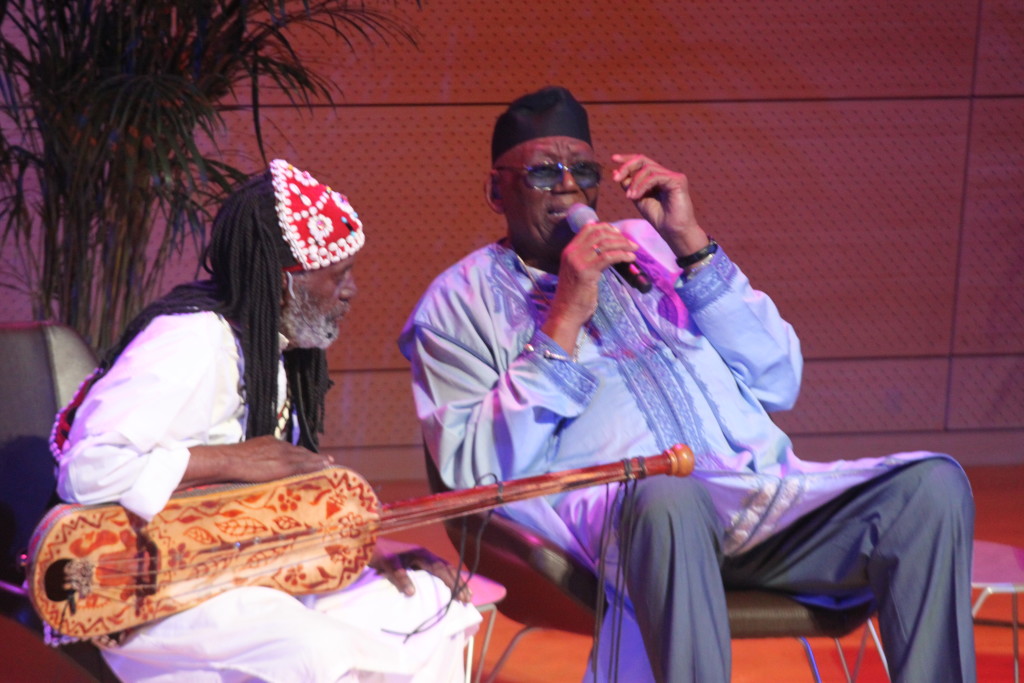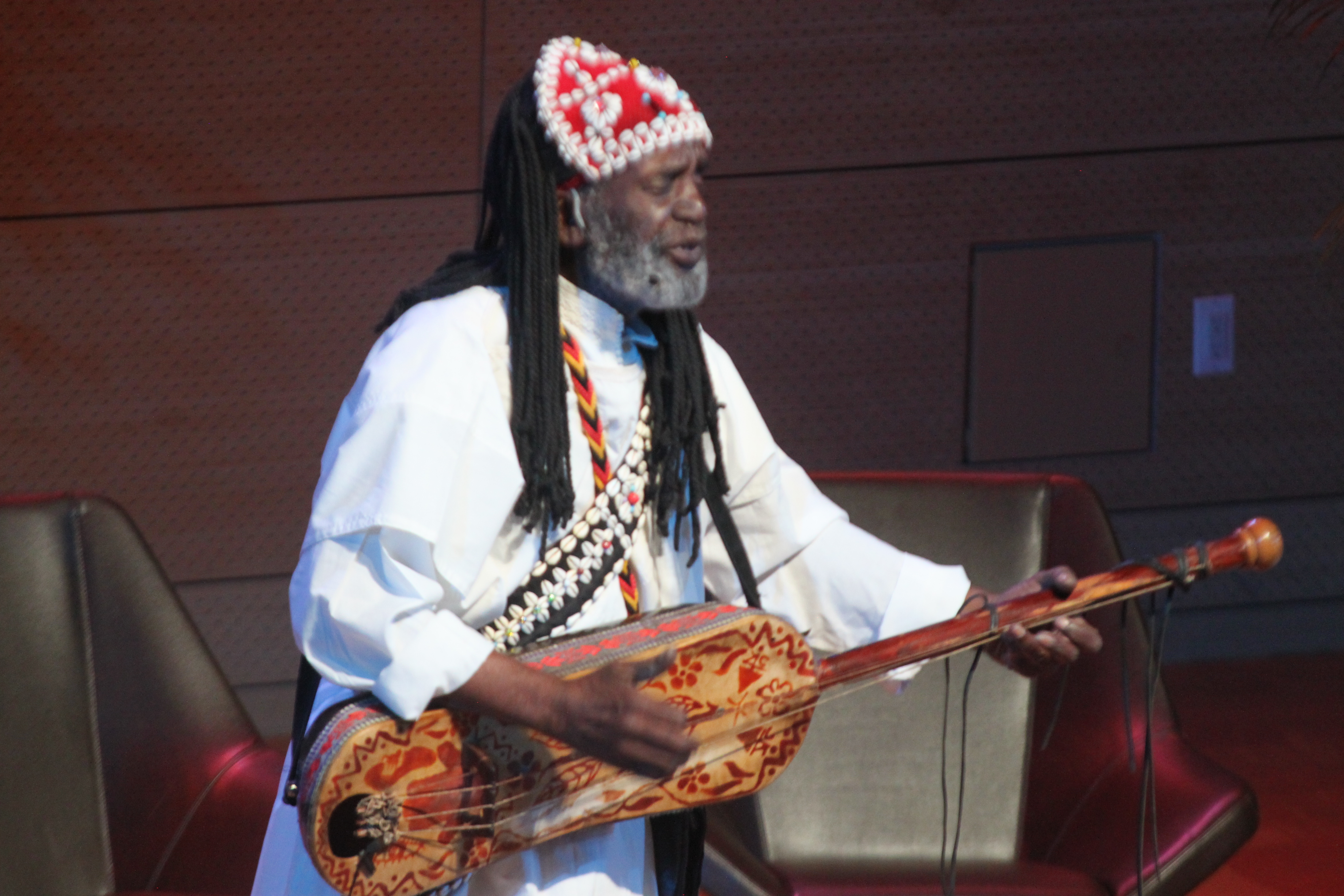Blog November 30, 2015
Moroccan Gnawa Legend Abdellah El Gourd Makes Rare New York Appearance With Randy Weston
 “It’s going to be a spiritual night,” Randy Weston advised the audience as he took the stage at Tischman Auditorium on Oct. 13. The jazz giant was on hand to host a rare stateside appearance of legendary Moroccan Gnawa musician Abdellah El Gourd, as part of Weston’s tenure at the Jazz Artist-in-Residence program at the New School.
Known to his fans as "Boulkhair," Abdellah El Gourd is one of the great masters (known as maâlems) of Morocco’s Gnawa tradition, and the founder of the Dar Gnaoua (“House of Gnawa”) cultural center in Tangier. He’s best known outside of Morocco for his cross-cultural collaborations with such jazz and alternative artists as Weston, Archie Shepp and German avant-rock outfit Dissidenten.
El Gourd was born in 1947 in Tangier, where he mastered both the 243 songs of the local repertoire, and the ritual practice behind each one. Gnawa music is part of a larger spiritual and cultural tradition practiced by Morocco’s black community—many of whom are descendants of slaves from sub-Saharan Africa, mainly Mauritania and Mali.
El Gourd and Weston’s relationship goes back to 1967, at the beginning of Weston’s storied five-year residence in Tangier. Weston has long since been one of Gnawa music’s great international champions, and has performed, toured and recorded with many of the music’s greatest practitioners over the years. Naturally, Weston and El Gourd have collaborated on numerous tours and some notable recordings, including 1994’s seminal The Splendid Master Gnawa Musicians of Morocco and the expansive Spirit! The Power of Music from 2000.
These two old friends came together once again to initiate a new generation of students and fans into the joys and mysteries of the Gnawa tradition, with an evening of music and discussion.
The event kicked off with a short video of Weston and El Gourd in performance together at a festival in Berlin in 1991—an introduction to both Weston’s Gnawa-jazz explorations, and some of the basics of the Gnawa sound itself.
Afterwards, Weston and El Gourd took the stage dressed to the nines in traditional Moroccan garb, which for Abdellah included a magnificent cowrie-shell covered cap and sash (sometimes described as “Bambara” in reference to their likely sub-Saharan origins), gleaming white tunic and trousers, and bright yellow Fassi babouche slippers.
He also brought his hujhuj, a massive, three-stringed lute, hollowed out of a single piece of wood and covered with goatskin and cowrie shells. Also known as a gimbri or sintir, the hujhuj is one of Gnawa’s signature instruments, usually reserved for the maâlems who lead the performance.
Their wide-ranging discussion covered everything from their first meeting, to the origins of Gnawa music, to the instrumentation, to the complex symbolism of colors and spirit possession in Gnawa ritual. While the soft-spoken El Gourd was initially a bit reticent, he spoke loud and clear once his troupe of koyous—Nour-eddin Touati, Khalid Rahhali, and his own son Abdeljabbar El Gourd—joined him to give a live demonstration of the music.
Together they performed selections from the Uled Bambara repertoire, a sort of warm-up session that takes before the serious business of a traditional Gnawa Lela spirit-possession ceremony begins. Since Lelas are both sacred and long—five to six hours at the minimum—these abbreviated Bambara sessions have become the popular face of Gnawa performance, and Al Gourd’s version didn’t disappoint.
El Gourd laid down a thudding, gutbucket bassline on his hujhuj, and his koyous provided a the chorus, with clattering, metal qarqaba castanets and rhythmic hand percussion, while their hypnotic, call-and-response vocals rose and fell like waves. One by one, El Gourd called each koyou to the front of the stage where they thrilled the audience with sequences of high-flying acrobatic kicks and jumps.
And that was just the beginning—though Weston and El Gourd spoke a little more about the music’s history and their personal journeys (with the able help of Samir LanGus, of New York’s own homegrown Gnawa troupe, Innov Gnawa), it was pretty clear that Weston was also itching to perform.
Weston took a seat at the piano and ran through three of his own original pieces written in and inspired by his travels in Morocco. “Night in Medina,” “Tangier Bay” and “Marrakech Blues.” Weston played unaccompanied, and the years haven’t diminished his game one whit. His attack was subtle and meditative, but still forceful and sophisticated when the material demanded, as on the abstracted post-bop of “Tangier Bay.”
The next set took a page from Morocco’s long-running Gnawa World Music Festival. Held annually in the seaside town of Essaouira for the last 18 years, the festival draws Gnawa musicians from all over Morocco, and is well known for programming “fusions” of headlining Western artists with the great maâlems and their troupes.
Weston has been attending and playing the festival since the beginning, and he’s been one of its biggest supporters abroad, too. So it was no surprise that he borrowed Essaouira’s fusion format to play a few songs accompanied by El Gourd and his koyous. Weston’s bluesy, minor-chord riffing helped tease out the microtonal nuances of El Gourd’s hujhuj, while the qarqaba galloped out a steady backbeat. It was a classic piano-bass-drums jazz trio recast Gnawa style, and it perfectly illustrated the trans-Atlantic musical connections that Weston had been making all evening.
But the last word—and song—went to Abdellah El Gourd, who closed out the evening with a seated, meditative performance that gave the audience a taste of the spiritual side of Gnawa music, exposing a batch of new young fans to the mysterious pull of this powerful tradition.
Watch full performance here:
“It’s going to be a spiritual night,” Randy Weston advised the audience as he took the stage at Tischman Auditorium on Oct. 13. The jazz giant was on hand to host a rare stateside appearance of legendary Moroccan Gnawa musician Abdellah El Gourd, as part of Weston’s tenure at the Jazz Artist-in-Residence program at the New School.
Known to his fans as "Boulkhair," Abdellah El Gourd is one of the great masters (known as maâlems) of Morocco’s Gnawa tradition, and the founder of the Dar Gnaoua (“House of Gnawa”) cultural center in Tangier. He’s best known outside of Morocco for his cross-cultural collaborations with such jazz and alternative artists as Weston, Archie Shepp and German avant-rock outfit Dissidenten.
El Gourd was born in 1947 in Tangier, where he mastered both the 243 songs of the local repertoire, and the ritual practice behind each one. Gnawa music is part of a larger spiritual and cultural tradition practiced by Morocco’s black community—many of whom are descendants of slaves from sub-Saharan Africa, mainly Mauritania and Mali.
El Gourd and Weston’s relationship goes back to 1967, at the beginning of Weston’s storied five-year residence in Tangier. Weston has long since been one of Gnawa music’s great international champions, and has performed, toured and recorded with many of the music’s greatest practitioners over the years. Naturally, Weston and El Gourd have collaborated on numerous tours and some notable recordings, including 1994’s seminal The Splendid Master Gnawa Musicians of Morocco and the expansive Spirit! The Power of Music from 2000.
These two old friends came together once again to initiate a new generation of students and fans into the joys and mysteries of the Gnawa tradition, with an evening of music and discussion.
The event kicked off with a short video of Weston and El Gourd in performance together at a festival in Berlin in 1991—an introduction to both Weston’s Gnawa-jazz explorations, and some of the basics of the Gnawa sound itself.
Afterwards, Weston and El Gourd took the stage dressed to the nines in traditional Moroccan garb, which for Abdellah included a magnificent cowrie-shell covered cap and sash (sometimes described as “Bambara” in reference to their likely sub-Saharan origins), gleaming white tunic and trousers, and bright yellow Fassi babouche slippers.
He also brought his hujhuj, a massive, three-stringed lute, hollowed out of a single piece of wood and covered with goatskin and cowrie shells. Also known as a gimbri or sintir, the hujhuj is one of Gnawa’s signature instruments, usually reserved for the maâlems who lead the performance.
Their wide-ranging discussion covered everything from their first meeting, to the origins of Gnawa music, to the instrumentation, to the complex symbolism of colors and spirit possession in Gnawa ritual. While the soft-spoken El Gourd was initially a bit reticent, he spoke loud and clear once his troupe of koyous—Nour-eddin Touati, Khalid Rahhali, and his own son Abdeljabbar El Gourd—joined him to give a live demonstration of the music.
Together they performed selections from the Uled Bambara repertoire, a sort of warm-up session that takes before the serious business of a traditional Gnawa Lela spirit-possession ceremony begins. Since Lelas are both sacred and long—five to six hours at the minimum—these abbreviated Bambara sessions have become the popular face of Gnawa performance, and Al Gourd’s version didn’t disappoint.
El Gourd laid down a thudding, gutbucket bassline on his hujhuj, and his koyous provided a the chorus, with clattering, metal qarqaba castanets and rhythmic hand percussion, while their hypnotic, call-and-response vocals rose and fell like waves. One by one, El Gourd called each koyou to the front of the stage where they thrilled the audience with sequences of high-flying acrobatic kicks and jumps.
And that was just the beginning—though Weston and El Gourd spoke a little more about the music’s history and their personal journeys (with the able help of Samir LanGus, of New York’s own homegrown Gnawa troupe, Innov Gnawa), it was pretty clear that Weston was also itching to perform.
Weston took a seat at the piano and ran through three of his own original pieces written in and inspired by his travels in Morocco. “Night in Medina,” “Tangier Bay” and “Marrakech Blues.” Weston played unaccompanied, and the years haven’t diminished his game one whit. His attack was subtle and meditative, but still forceful and sophisticated when the material demanded, as on the abstracted post-bop of “Tangier Bay.”
The next set took a page from Morocco’s long-running Gnawa World Music Festival. Held annually in the seaside town of Essaouira for the last 18 years, the festival draws Gnawa musicians from all over Morocco, and is well known for programming “fusions” of headlining Western artists with the great maâlems and their troupes.
Weston has been attending and playing the festival since the beginning, and he’s been one of its biggest supporters abroad, too. So it was no surprise that he borrowed Essaouira’s fusion format to play a few songs accompanied by El Gourd and his koyous. Weston’s bluesy, minor-chord riffing helped tease out the microtonal nuances of El Gourd’s hujhuj, while the qarqaba galloped out a steady backbeat. It was a classic piano-bass-drums jazz trio recast Gnawa style, and it perfectly illustrated the trans-Atlantic musical connections that Weston had been making all evening.
But the last word—and song—went to Abdellah El Gourd, who closed out the evening with a seated, meditative performance that gave the audience a taste of the spiritual side of Gnawa music, exposing a batch of new young fans to the mysterious pull of this powerful tradition.
Watch full performance here:









